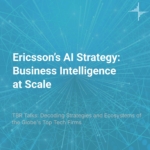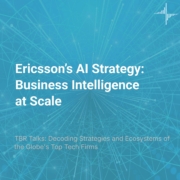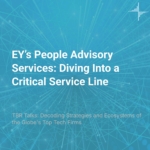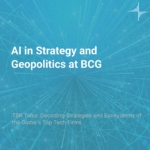Ericsson’s AI Strategy: Business Intelligence at Scale

In our Season 4 premiere episode Elizabeth Roberts, global head of Information Management at Ericsson, joins “TBR Talks” host Patrick Heffernan to share insights into what Ericsson is doing to leverage AI tools for internal knowledge management at the world’s leading telecom vendor.
With over 3,000 regular users, each of whom support different business groups, executives and field leaders, Ericsson’s Business Intelligence Center (BIC) has become a powerful use case of AI internally. Elizabeth shares the challenges with AI adoption, change management and the never-ending need for quick and correct intelligent answers to business questions.
Episode highlights:
• How roles have changed because of technology
• Changes and accelerations in company culture
• Ericsson’s new AI tool: Ask BIC
Listen and learn with TBR Talks!
Submit your Key Intelligence Questions for Patrick and his guests
Connect with Patrick on LinkedIn
Learn more about TBR at https://tbri.com/
TBR Talks is produced by Technology Business Research, Inc.
Edited by Haley Demers
Music by Burty Sounds via Pixabay
Art by Amanda Hamilton Sy
Ericsson’s AI Strategy: Business Intelligence at Scale
TBR Talks Host Patrick Heffernan: Welcome to TBR Talks: Decoding Strategies and Ecosystems of the Globe’s Top Tech Firms, where we talk business model disruption in the broad technology ecosystem from management consultancies to systems integrators, hyperscalers to independent software vendors, telecom operators to network and infrastructure vendors, and chip manufacturers to value-added resellers. We’ll be answering some of the key intelligence questions we’ve heard from executives and business unit leaders among the leading professional IT services and telecom vendors.
I’m Patrick Heffernan, Principal Analyst, and today we’ll be talking about Ericsson’s AI strategy and new AI assistant, with Elizabeth Roberts, Global Head of Information Management at Ericsson. When the Ericsson team released the tool to the full organization, the name was established as “Ask BIC” to keep the team branding consistent, but in this conversation, it was referred to as Erica. Welcome to season 4 of TBR Talks. Please enjoy my chat with Elizabeth.
How roles have changed because of technology
Elizabeth, thank you so much for coming on this podcast, I really appreciate it. We have known each other for over a decade now in our respective jobs, at Ericsson for you and TBR for me. I just, for everyone listening, could you just maybe sort of walk through what is your title? What is your actual role at Ericsson? I just know you as Elizabeth from Ericsson, but I’m sure others at Ericsson actually know you by title so, what is it?
Elizabeth Roberts, Global Head of Information Management at Ericsson: So, my external title is Global Head of Information Management, which is a nice, fancy, fluffy title. Internally, I’m known as the head of BIC, Business Intelligence Center. And that actually defines my role better, which is more of the responsibility of taking care of all of the external research and getting it into one portal where all the users internally can access it.
Patrick: And about how many users a month, say, access BIC?
Elizabeth: We have about 3,000 that are fairly consistent monthly users.
Patrick: Okay.
Elizabeth: We have about 300 that use it almost daily. So not a bad amount for, you know, a company of 100,000 people.
Patrick: Yeah, that’s fantastic. And I mean, responding to being responsible to 3,000 users a month, that’s not a small task. I imagine you get a lot of compliments and complaints, right?
Elizabeth: A lot of complaints more than compliments, but that’s okay. We learn from a lot of the complaints. So, it makes things better.
Patrick: Excellent. I want to ask you just sort of, because you’ve been there a while at Ericsson and your job maybe has evolved a bit and changed a bit, but really talk about some of the changes in the last couple years, either from a technology perspective or from a responsibilities within an Ericsson perspective. And technology has changed so much in the last couple years, I’m curious if there are things that when you look back and you think about, okay, my job five years ago was not this because of a piece of technology, or my job five years ago was not this because of new responsibilities. I wonder which has changed more for you?
Elizabeth: I’d say responsibilities, but the responsibilities came about as a result of technology. You know, Google is an amazing thing, you know, when we talk about a search engine, it really honestly and truly has changed how research is done. And so, the technology behind how people search for information has changed, which means how I go about answering questions has changed. And I don’t actually have to answer nearly as many questions as I used to five years ago. That technology is available there to make it easier for end users. So, I spend a lot more of my time actually doing more things contract-wise, things along the lines of dealing with compliance and legal and things like that to make sure that we have rights to use the information. And just ways of making information easier to find for people, because while it’s easier to search, you know, natural language search isn’t as great as we’d all like it to be. I wish it could all be just as easy as saying, where can I find X? And the answer would come right back to me, but it’s still not there yet. We’re getting closer.
Changes and accelerations in company culture
Patrick: And how much has the culture within Ericsson changed? And I know that’s a really loaded question, but in the time that we’ve known each other, the workplace has definitely changed. I mean, from a technology perspective, as you mentioned, that sort of search has been increasingly better and better refined. We had, AI has become such a huge part of our daily lives. But also we went through a pandemic, we went through a whole work from home surge, and now it’s changed, and now we’re heading back in the other direction. And I’m wondering, as a technology company, how much has the, not just the technology, but also the culture within Ericsson changed?
Elizabeth: The culture within Ericsson has changed quite a bit. I think the pandemic actually, like most other companies, forced us to become faster at certain things. And in fact, my laptop became 5G enabled last week.
Patrick: Wow, alright.
Elizabeth: So, I don’t have to connect to Wi-Fi anymore. I could be anywhere, which is an amazing thing. So, in that aspect, I think it’s going to continue to change. I think the biggest cultural change, honestly, within Ericsson is related to compliance. I think we’re a lot more conscious now of what can and can’t be done in certain things. And some of that’s come about because of forced circumstances. And some of it’s come about just because of how fast technology has changed. You know, we used to have the huge standards that said, well, this is how things are done and you had to go through them. And now you don’t have time to spend, you know, 8/10, 9/12 months writing a standard to get to how something should be done in technology. You just kind of say, okay, well, how do we do this, and how do we get it done fast for the customer? So.
Patrick: Right. Yeah, that is, I mean, and for a, especially for an established, a well-established technology company making that kind of cultural change to speed up, to accelerate, to make changes faster, that can be really hard.
Elizabeth: Yeah, it can.
Patrick: And your role as, sort of in some ways the chief information officer, you could say, how, is it- do you feel like you’re part of helping with that acceleration?
Elizabeth: I think so, because I find myself more and more often trying to find answers to questions that there’s no research for. You know, we’re starting to- before it would be, okay, how do we find this answer? And it was fairly easy to find established information because we were, you know, technology wasn’t changing as quickly. And now we’re at- we have people asking questions where there is no research created. There is nothing that’s there. It’s going to have to be created. And so, it’s a matter of, well, where do we go to try and start to put this together?
Finding answers to unanswerable questions
Patrick: And is that where you just, you’re relying on the trusted resources you’ve had and you’re sort of cobbling together a few different trusted views? Or how are you- that’s crazy to me that you’re getting questions that have no answers to them, and you’re tasked with finding them out. So, what are you doing exactly? Where are you going?
Elizabeth: We just keep asking the question over and over again in different ways and talking to analysts and talking to the firms we work with and talking to people like you, Patrick, where, you know, you might say something that then sparks a different way of looking at the answer to the question, or maybe there’s something that’s said that, oh, we hadn’t thought about that. You know, if you look at the RIC market, so radio, intelligent radio, RAN controller, there was nothing there. But in order to try and figure out how to do something to create a forecast, well, somebody said, well, why haven’t you looked at SMS and the growth of SMS? I mean, it’s kind of the same thing. Well, then suddenly you realize, you know, I’ve been going about this backwards. I’ve been trying to find information on something that doesn’t exist when I should have been trying to find information on something that did exist that I could then draw a parallel to, to create some sort of, you know, beginning of a forecast so that we can look at, you know, how is this going to trend, how is this going to change? And I think that’s where AI is really going to come into play in the future is being able to take things that, as you start to ask questions about the unknown, can it help you find those known parameters to come up with, well, ways to start trying to find an answer to the unknown?
Patrick: Yeah, so let’s talk about that. I mean, in five years from now, do you think a lot of these questions are going to be easier to answer because the artificial intelligence is going to be better? Or where do you, where do you see, how do you see your job? How do you see those challenges being different five years from now?
Elizabeth: I honestly don’t see my job being that much different, to be really honest. I think the need for what I actually call antiquated skills, which is that ability to doggedly search, to try and find an answer to their problem and a puzzle, is not going to go away. AI will make it faster, for sure. But it’s, you know, you’re still going to have to have somebody who can think about a problem in multiple different ways because an AI can only think about the problem the way you write the question.
Patrick: Right.
Elizabeth: It’s not going to be able to take that question and think about it 16 different ways and go, okay, well, let’s look at it from this direction now. There’s still going to have to be somebody who does that and tells the AI to look at it differently.
Patrick: Right. So, it’s that sort of persistence and judgment that you’re going to have to continually bring to the table, right?
Elizabeth: Correct. Yes.
Ericsson’s new AI tool: Ask BIC
Patrick: Yeah. But I know that you’ve got a new tool, a new colleague, if you will. So-
Elizabeth: Yes, we have an intern now. We call her Erica.
Patrick: Tell me more about that.
Elizabeth: So, Erica is an AI-driven research assistant. We refer to her as an intern basically because she’s still learning. You know, she’s good at answering qualitative questions, like most AI. The problem is quantitative. There’s not really an LLM out on the market that I’ve found, if somebody knows of it, I’d love to know, that can handle numbers and, you know, great big spreadsheets and things like that. That, you know, you and I spend our days living in.
Patrick: Exactly.
Elizabeth: So, until there’s an LLM that can do that, analysts aren’t going to go away because they can handle the numbers. But no, Erica’s been great for answering, you know, some of the more simple, I hate to say more simple, but it’s more simple questions. You know, what are the AI use cases in telecom? You know, she can produce a really nice report to start that answer, but then somebody once they’ve looked at that can delve deeper into, okay, well, what are the front-end and the back-end use cases? You know, can you break that down for me? So, in that aspect, it’s great. The thing that makes Erica different from other things out in the world, AI wise, is she only looks at the resources we tell her to look at. So, she only has about 13 providers that she can read. And we went through a lot of work with those providers to get clearance and permission and the ability in our contracts to use that information in a large language model, because a lot of research providers obviously don’t want to have their research used in an open model where it could suddenly become, you know, common knowledge and things like that. But Erica’s closed, she’s a walled garden, as we used to say in the telecom. And, you know, it’s been interesting. It was a part of my job I never thought I’d learn to do, but I enjoy it.
Patrick: That’s awesome. And so, I’m curious whether internally whether the use case for Erica is more sales enablement, more competitive intelligence, more market intelligence? Is there, do you see it, do you see Erica leaning in any one particular direction in terms of how she gets used?
Elizabeth: We actually have a lot of use from the strategic side.
Patrick: Okay.
Elizabeth: So more of those developing insights. Yes, there’s still the traditional, you know, produce a SWOT analysis on this company in this particular, you know, product area, or give me a comparison of competitor X to us in this service, but we’re seeing a lot more of it from the perspective of tell me about insert a topic here and how it’s going to impact us in the future.
Patrick: Yeah, and I guess, and it makes sense, and if that’s where it’s being used now, that you want to restrict the number of inputs. You want to, like you said, keep it only to the trusted providers that you’re- you believe in their data, you believe in their analysis, you believe in their opinions, and you want to make sure that that’s captured there, but not just the whole world. So that makes a ton of sense.
Elizabeth: It does. And then the other thing we love about what Erica does is she’s a great intern in the fact that she cites her sources. So, everything she comes back with, she can tell you exactly where it came from. So, if you have a question about whether or not it’s right, you can actually go look at the original report and see where that quote that she’s pulled out has come from.
Patrick: So, she’s not come back and said, I made all this up myself? That hasn’t been one of her responses?
Elizabeth: No, in fact, if she doesn’t know an answer, she’ll come back and tell you, I’m sorry, there’s not enough research for me to provide you an answer.
Patrick: Wow.
Elizabeth: I had a hallucination finally the other day. I was doing some work on one of our competitors and she came back, and she told me she couldn’t find information on Nike.
Patrick: Ah, *laughs*
Elizabeth: Now, there’s several letters in that are very similar to Nokia, but it was after, I’ll be honest, it was after I had run multiple different queries in the same kind of conversation. And so, we were kind of at the end of the limits of the research that was available. So, it makes sense to me, but there’s still things like that do kind of occur and I get a good laugh out of it.
Patrick: So, for a moment there, you had me hopeful that I could get some nice new Ericsson kicks one day, you know, like get the logo on the side, look like an Adidas or something. So that wouldn’t be so bad.
Elizabeth: Well, no, actually, it’s Nokia that used to make tires and shoes, so you’ll have to go with them.
Where Ericsson will be in 15 years
Patrick: That’s true. That’s true. Listen, I want to just wrap up with one question. You know, you’ve been doing this job for a while, and Ericsson has been really- has been a kind of company that we always have to keep an eye on because it’s such an important player across the market, such an important player in the ecosystem. And I’m just curious, when you look out sort of 10-15 years from now, where do you see Ericsson? How do you see- you’ve had such a great window into how the company has evolved and changed and grown over the last 15 years. Where does it go in the next 15?
Elizabeth: I think Ericsson will continue to be a leader in back-end telecom technology.
Patrick: Okay.
Elizabeth: That’s always been our bread and butter. So as the technology changes, as it becomes more software driven, as it honestly becomes more AI driven, I can see Ericsson transitioning to help that move faster and more smoothly so that, you know, there’s not the interruption on the front-end for the operators or for the end consumer. They’ll never see, you know, everything we do and all of that. And that’s okay. You know, as long as the backbone works and runs, that’s what matters.
Patrick: That’s awesome. And that, I mean, we’ve seen, especially in the last five years, you know, the companies that have said, this is what we do well. We’re staying in our lane. We’re going to continue to do it well. Those are the ones that have grown, outpaced the competition. And so, I think that’s just a great strategy going ahead for Ericsson.
Final thoughts
Patrick: All right, I lied. One more question. I know you were recently in New Orleans, a city that I absolutely love because I love to eat. So, I need to know what your favorite foods were. And I say foods because you can’t go to New Orleans and have one favorite thing. So, what did you love the most?
Elizabeth: Well, you know, Patrick, I’m a researcher at heart. So of course I had to do some research. So, I visited multiple places for beignets, I have a ranking system now for beignets. I can tell you where to go for the most- the crunchiest ones, the ones with the most sugar, the ones that are flakiest. So obviously beignets, but gumbo. I mean, you can’t go wrong with gumbo.
Patrick: Yeah.
Elizabeth: And here in Texas, they make gumbo, but they leave the okra out, which just is like, that’s not gumbo.
Patrick: It’s not gumbo, no.
Elizabeth: That’s shrimp soup. *laughs*
Patrick: All right, now I know what I’m making for dinner tonight. So, I got to swing by the Market Basket and see if I can find some okra because yeah, I do love some gumbo. Excellent. Elizabeth, thank you so much. An enormous pleasure. And I’d love to have you come back in about six months or so, because I want to hear how your intern’s doing and whether or not she’s been promoted to a full-time position.
Elizabeth: Sounds good to me. I’d be happy to.
Patrick: Excellent, thank you, Elizabeth.
Tune in next week for another episode of TBR Talks. Don’t forget to send us your key intelligence questions on business strategy, ecosystems, and management consulting through the form in the show notes below. Visit tbri.com to learn how we help tech companies, large and small, answer these questions with the research, data, and analysis my guests bring to this conversation every week.
Once again, I’m your host, Patrick Heffernan, Principal Analyst at TBR. Thanks for joining us and see you next week.
TBR Talks: Decoding Strategies and Ecosystems of the Globe’s Top Tech Firms
Join TBR Principal Analyst Patrick Heffernan weekly for conversations on disruptions in the broader technology ecosystem and answers to key intelligence questions TBR analysts hear from executives and business unit leaders among top IT professional services firms, IT vendors, and telecom vendors and operators.
“TBR Talks” is available on all major podcast platforms. Subscribe today!

 Technology Business Research, Inc.
Technology Business Research, Inc. Technology Business Research, Inc.
Technology Business Research, Inc. Technology Business Research, Inc.
Technology Business Research, Inc.